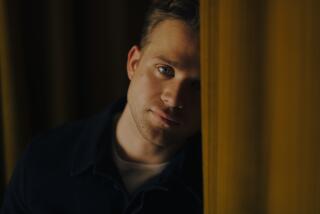Television review: ‘Woody Allen: A Documentary’
Six years ago, when Woody Allen’s “Match Point” debuted at the Cannes Film Festival, the news conference that followed the media screening was, to put it mildly, a zoo. After a string of box office and even critical failures, Allen seemed to have lost his way; “Match Point” was his renaissance.
So reporters from all around the world (including, at the time, me) were happy to stuff themselves into a small room if it meant a chance to sit before the phoenix risen and ask him questions about life, death, love and art. Allen, though gracious and amusing in his replies, refused to be courted as a sage, answering instead as filmmaker. He spoke of budgets, tax incentives, weather, accents and the nuts and bolts of storytelling, a master craftsman addressing an audience that appeared to be seeking something closer to the Messiah.
Allen waxes a bit more philosophical in Robert Weide’s “Woody Allen: A Documentary,” which premieres its first of two installments Sunday on PBS’ “American Masters,” but not much. Broader, certainly — Weide, an Oscar-nominated documentarian and Emmy-winning director and executive producer on HBO’s “Curb Your Enthusiasm,” spent a year and a half interviewing Allen, taking him from his earliest memories through the latest hit, “Midnight in Paris.”
The result is more omnibus than revelation, but then it is difficult to imagine a true revelation from or about Allen at this point. Although much is made of his shyness — he famously skipped the Oscars until the broadcast that ran just after the attacks of 9/11 — he has become something of a cinematic essayist, offering the world his thoughts and opinions on an annual basis through film.
From the time he began submitting jokes to newspaper columnists in the 1950s, Allen’s work has been if not perpetually autobiographical then certainly consistently personal. As fine a work as “Woody Allen: A Documentary” is, it does beg the question of why the public always seems to need more than the work of its artists, even those who so transparently offer their essential selves through that work.
Though silver-haired and perhaps a trifle jowly at 75, Allen is as he ever was — wry, self-deprecating and given much more easily to questions than answers. “Midnight in Paris” may be steeped in nostalgia and sentiment, but the man who made it is not.
Allen is still very much a filmmaker and discusses his work, past, present and future, in tactile realities — here is the drawer filled with legal pad pages on which ideas have been scrawled; here is the typewriter he still employs (when he says cut and paste, he means it literally); here he is, still in his sweaters, baggy chinos and hat, giving his famously bare-bones direction to an endless assortment of stars. Much of which, many of his stars agree, boils down to “pick up the pace,” because, he says, “I’d rather be home watching the game.”
Ever since the agents he sought to represent his writing convinced him to begin performing as well, Allen has wobbled, Chaplin-like, along the narrow but comedically fertile border between self-obsession and self-loathing, thereby creating the 20th century’s most famous Everyman. A very specific version of the archetype — New York, Jewish, neurotic as can be — but one grounded nonetheless in three of the most American of values: a devotion to romance, a love of sports and a solid work ethic.
In his 60-year career, Allen has made more than 40 films, which is simply too big an output for the conventional definition of artiste. Which he never claimed to be. An auteur, yes. An artiste, no.
And that is the creature that Weide manages to capture. Given context by film critics and academics, fleshed out by a host of Allen stars, (including muses Diane Keaton and former wife Louise Lasser) and arrayed in anecdote by intimates (including manager Jack Rollins, cinematographer Gordon Willis, and co-writers Mickey Rose and Marshall Brickman,) Allen emerges as a man who defied every expectation save his own. Allen makes movies to please himself, moving from screwball comedies such as “Bananas” to the character-driven pathos of “Annie Hall” to the darker tones of “Interiors” and “Crimes and Misdemeanors.”
Not all of his movies have been great, or even good, but as Mariel Hemingway says, when you make as many movies as Allen does, there are going to be a few clunkers. There are those who have suggested that if Allen took more time with each film, there would be fewer clunkers. But watching Allen speak of his work, it becomes clear that he is not the type of filmmaker to care about anything except telling the story that is currently the buzzing the loudest in his head.
In fact, he isn’t really any type of filmmaker at all, he simply is a filmmaker — one of the few true purists, the auteur of his own life, take it or leave it. And that may be his most remarkable legacy of all.
‘Woody Allen: American Masters’
Where: KOCE
When: 9 p.m. Sunday; concludes 9 p.m. Monday
Rating: TV-14 (may be unsuitable for children under the age of 14) (Sunday); TV-PG (may be unsuitable for young children) (Monday)
More to Read
The complete guide to home viewing
Get Screen Gab for everything about the TV shows and streaming movies everyone’s talking about.
You may occasionally receive promotional content from the Los Angeles Times.







